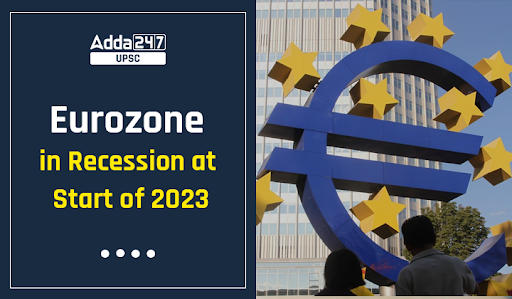Table of Contents
Eurozone Recession 2023 in News
Recent data from the EU’s statistical agency revealed that the eurozone experienced a technical recession at the beginning of the year, with a contraction of 0.1 percent for two consecutive quarters. The eurozone, consisting of 20 countries that use the euro as their currency, experienced a mild recession at the beginning of the year 2023, while the broader European economy managed to avoid a downturn.
Eurozone Recession Explained
Revised official data published on Thursday revealed that the gross domestic product (GDP) of the euro area declined by 0.1% in the first quarter compared to the previous quarter.
- Similarly, in the fourth quarter of 2022, GDP also decreased by 0.1%. These revisions confirm that the euro zone was indeed experiencing a technical recession.
- In contrast, the European Union as a whole witnessed a slight increase of 0.1% in output during the first quarter, following a 0.2% decline in the previous quarter, effectively evading a recession.
Reason Behind Eurozone Recession
The persistently negative data, including weak German industrial production and new orders, suggests that the European economy is currently experiencing stagnation. Following factors can be attributed to the recent Eurozone Recession in the beginning of the year 2023-
Germany’s Recessionary Data
The downward revision was primarily driven by a second assessment from Germany’s statistics office, which revealed that the largest economy in the euro zone had entered a recession in early 2023. The notable downward revision of Eurozone GDP can be primarily attributed to Germany revising its figures downward as updated data became available.
- This reinforces the notion that economic activity in March was notably feeble, diminishing the likelihood of a rapid recovery in the second quarter.
- The disappointing figures can be attributed to reduced demand in Europe’s largest economy, caused by inflation and higher interest rates.
- Given the overall weakness observed in May’s survey data, it is probable that we will only witness a modest improvement following two consecutive quarters of economic decline.
Inflationary Pressures Followed by Rising Interest Rates
The eurozone encountered difficulties arising from inflationary pressures, resulting in higher interest rates.
- In response, the European Central Bank implemented a series of interest rate hikes totaling 3.75 percentage points since commencing its monetary tightening measures in the previous year’s July.
- The surge in energy prices, driven by Russia’s conflict with Ukraine, added further strain on the economies of the eurozone.
- This situation led to heightened inflationary pressures and a decline in consumer demand.
Eurozone Energy Crisis and Declining Consumer Confidence
Over the past year, the substantial increase in gas and oil prices had a considerable impact on household confidence and resulted in a decrease in consumption. This, in turn, affected domestic demand within the eurozone.
- Gas and oil prices have surged due multiple disruptions that has happened since the Russia-Ukraine War Began.
- This surge led to poor consumer confidence and consumption and ultimately becoming one of the important causal factor in the Eurozone Recession 2023.
External Factors causing Eurozone Recession
The eurozone economies have faced additional challenges due to a slowdown in the United States and a recovery in China that has been weaker than anticipated. These factors have had a detrimental effect on exports from the eurozone. Poor exports demand from these big economies put pressures on Eurozone’s economic growth resulting in Eurozone Crisis.
Impact of Eurozone Recession
Andrew Kenningham, chief Europe economist at Capital Economics, highlighted the significant impact of high inflation and rising interest rates on consumer spending, leading to a contraction in the economy. He further anticipated that the economy is likely to contract further throughout the rest of the year.
In general, the eurozone economy is currently navigating through a phase of moderate progress, as the impact of monetary policy becomes more pronounced, the effects of post-pandemic spending diminish, and concerns about the energy crisis loom.
What is Recession?
A recession refers to a period of significant economic decline characterized by a sustained contraction in economic activity.
- It is typically marked by a decline in gross domestic product (GDP), reduced production and consumption, rising unemployment rates, and overall sluggishness in the economy.
- During a recession, businesses experience reduced revenues, consumers tend to spend less, and there is often an increase in unemployment.
- Governments and central banks implement various measures to stimulate economic growth and mitigate the negative impacts of a recession, such as monetary and fiscal policies.
What is Technical Recession?
A recession is typically defined as two consecutive quarters of economic contraction. A technical recession refers to a specific type of economic downturn characterized by two consecutive quarters of negative economic growth, typically measured by a decline in gross domestic product (GDP).
- Unlike a general recession, which encompasses broader economic indicators and can last for an extended period, a technical recession focuses specifically on the consecutive quarters of negative GDP growth.
- It is a term used to describe a relatively short-term period of economic contraction within a larger economic cycle.
Recession Vs Depression
Recession and depression are both terms used to describe economic downturns, but they differ in terms of severity, duration, and impact on various economic indicators. It’s important to note that the specific criteria and definitions of recessions and depressions can vary among economists and policymakers, and there is no universally agreed-upon threshold for categorizing these economic downturns. Here are the key distinctions between recession and depression:
- Severity: A recession is typically considered a milder and relatively shorter period of economic contraction compared to a depression. A depression is a more severe and prolonged economic downturn characterized by a substantial decline in economic activity.
- Duration: A recession is generally defined as a period of at least two consecutive quarters of negative economic growth, typically measured by a decline in GDP. On the other hand, a depression can last for several years, and the recovery process is much slower.
- Impact on economic indicators: In a recession, there is a decline in economic indicators such as GDP, industrial production, employment rates, and consumer spending. However, in a depression, these indicators experience a more severe and sustained contraction. Unemployment rates tend to be much higher during a depression, and the overall economic environment is marked by widespread business failures and financial distress.
- Financial and psychological impact: A recession can lead to financial hardships, job losses, and decreased consumer confidence, but a depression is characterized by deeper financial crises, bank failures, and a significant decline in asset values. Depressions also have a more profound impact on people’s psychological well-being, with long-lasting effects on consumer behavior and investment patterns.
- Policy response: Governments and central banks typically respond to recessions with measures such as fiscal stimulus, monetary easing, and other policies to stimulate economic growth. During a depression, policymakers may implement more extensive and unconventional measures to address financial crises, stabilize the banking sector, and restore confidence in the economy.
Recession in India
Many Indians have experienced a decline in confidence due to the increasing interest rates on loans. The Reserve Bank of India (RBI) had been resolute in raising the policy repo rate until a decrease in inflation prompted the central bank to halt interest rate hikes. Over the period from May 2022 to February 2023, the RBI raised interest rates by 250 basis points. Following Parameters suggest that Indian Economy is safe from any economic recession-
- Gross Domestic Product (GDP) Growth:1% in Jan. to March. quarter of FY 2022-23,
- Consumer Price Inflation (CPI): Above 6% in April 2023
- India’s Industrial Output (IIP):6% year-on-year (YoY) in Feb. 2023
- Unemployment Rate: According to data compiled by the Centre for Monitoring Indian Economy (CMIE), India’s unemployment rate, which reached a peak of 23.5% in April 2020 during the height of the Covid-induced pandemic, has decreased to 8.11% in April 2023. However, it remains higher than the unemployment rate of 7.8% recorded in March 2023.
Considering the available data on economic indicators and in comparison to other global economies, it appears that India is not currently heading towards a recession. However, it is important to exercise prudence and plan for the future to mitigate any potential personal finance crisis that may arise. Being prepared for challenging times would be a wise approach to avoid any adverse impact on personal financial stability.


 UPSC Eligibility Criteria 2024- Age Limi...
UPSC Eligibility Criteria 2024- Age Limi...
 UPSC Prelims Exam Date 2024, Check New E...
UPSC Prelims Exam Date 2024, Check New E...
 UKPSC RO ARO Result 2024 Out, Download M...
UKPSC RO ARO Result 2024 Out, Download M...







